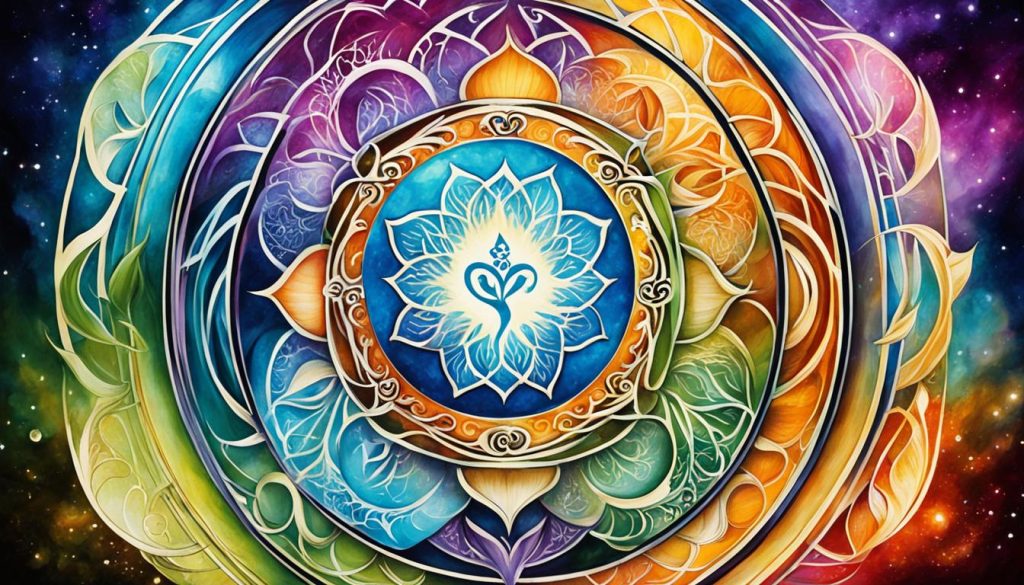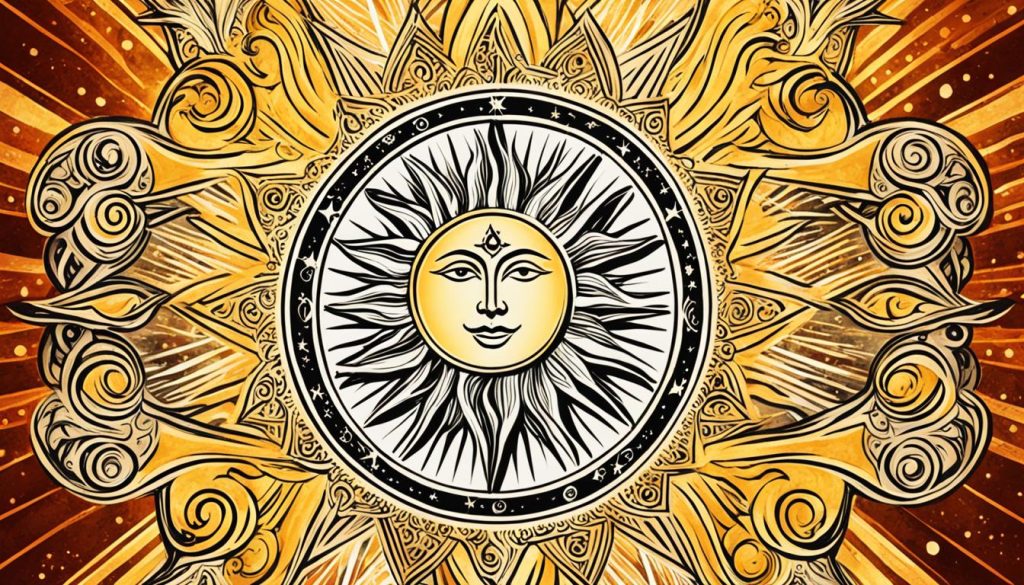Spiritual symbols have been a part of human culture for thousands of years, transcending different traditions and cultures. They hold deep meanings and represent beliefs, ideas, and concepts of spirituality. These symbols help people understand and connect with the deeper aspects of spirituality. From the Om to the Lotus Flower, there are numerous spiritual symbols that embody positive energy and harmony. In this article, we will explore 21 common spiritual symbols and their meanings, unlocking their sacred significance and divine energy.
Have you ever wondered about the hidden meanings behind spiritual symbols? How do these ancient icons hold the power to transform our lives and bring about harmony? Join me as we embark on a journey to delve deeper into the world of positive spiritual symbols. Let’s uncover their sacred symbolism and explore the spiritual imagery that has captivated humanity for centuries.
Key Takeaways:
- Positive spiritual symbols hold deep meanings and represent beliefs, ideas, and concepts of spirituality.
- These symbols help people connect with the deeper aspects of spirituality and embody positive energy and harmony.
- In this article, we will explore 21 common spiritual symbols and their meanings, unlocking their sacred significance and divine energy.
- By understanding and embracing the power of these symbols, we can enrich our lives and deepen our spiritual practice.
- Exploring spiritual symbols from different traditions fosters unity, connection, and broadens our perspective on spirituality.
The Power of Spiritual Symbols
Spiritual symbols hold immense power and importance in our lives. They have been passed down from generation to generation through stories, myths, religious texts, and rituals. These symbols represent profound concepts and help us understand the mysteries of the world and our existence.
Spiritual symbols serve as tools for communication, self-expression, and spiritual growth. They have the ability to connect with people from all walks of life, fostering a sense of unity and understanding. These symbols can uplift our spirits and bring about a sense of symbolic positivity in our lives.
By exploring and embracing the power of these symbols, we invite their sacred significance into our lives. They awaken our intuition, inspire us to seek higher truths, and guide us on our spiritual journey. Whether it’s a simple gesture or a complex icon, every symbol carries a unique message and carries the potential to transform our lives.
Spiritual symbols are like uplifting signs along our spiritual path, guiding us towards deeper meaning and connection. They remind us of our innate spirituality and help us tap into the divine energy that surrounds us.
Whether we encounter these symbols in art, nature, or religious settings, they have the power to evoke emotions, spark contemplation, and facilitate personal transformation. They open our hearts and minds to new perspectives and provide a sense of solace and inspiration during challenging times.
By embracing the spiritual symbolism in our lives, we invite a deeper level of awareness and connection with the sacred. These symbols serve as reminders of the beauty and interconnectedness of all things, and they invite us to live a life filled with purpose and intention.
As we embark on a journey of self-discovery and personal growth, these symbols act as guiding beacons. They remind us of our true essence and encourage us to align our actions with our spiritual aspirations. By incorporating these symbols into our daily lives, we can experience a profound sense of unity with the divine and find solace in the symbolic richness of the world.
Common Spiritual Symbols and Their Meanings
In this section, we will explore 21 common spiritual symbols and their meanings. These symbols come from various traditions and cultures and have profound significance. Let’s delve into the rich symbolism and deep spiritual imagery behind these positive spiritual icons.
The Cross
The Cross is a powerful symbol in Christianity, representing love, finality, and fulfilled promises. It serves as a constant reminder of the sacrifices made and the infinite love that transcends time.
The Vajra
The Vajra is an iconic symbol in Tibetan Buddhism, symbolizing the indestructible nature of enlightenment. It represents the strength and clarity of one’s mind, cutting through ignorance and leading to spiritual awakening.
The Lotus Flower
The Lotus Flower holds significant meaning in both Buddhism and Hinduism. It symbolizes purity, enlightenment, and spiritual rebirth. Just like the lotus rises above muddy waters, it reminds us to seek spiritual growth and transcend challenges in life.

Other Symbols
These are just a few examples of the vast array of spiritual symbols that exist across cultures. Other symbols include the Ankh, representing eternal life in ancient Egyptian culture; the Yin and Yang, symbolizing balance and harmony in Taoism; and the Tree of Life, embodying interconnectedness and spiritual growth.
Each of these spiritual symbols holds its own unique symbolism and can serve as a guide in our spiritual journeys. By understanding their meanings and embracing their positive spiritual energy, we can deepen our connection with the divine and cultivate inner peace and harmony.
The Universal Significance of Spiritual Symbols
Spiritual symbols hold a special place in our lives, transcending cultural boundaries and resonating with people across the globe. According to Jungian psychology, these symbols are known as archetype images that tap into the collective unconscious, representing deep aspects of the human psyche. They have the power to awaken our spiritual journey and provide a deeper understanding of ourselves and the cosmos.

While spiritual symbols differ from spiritual alchemy symbols, both serve the purpose of representing abstract ideas and tapping into the spiritual realm. Universally recognized symbols, such as the Yin Yang, the Tree of Life, or the Eye of Providence, transcend cultural differences and speak to the core of our being.
“Symbols are the experiences of mankind … they mix the real and the unreal, truth and falsehood into a multicolored mythical image that fascinates our minds.” – Carl Jung
Exploring spiritual symbols from different traditions deepens our connection with the divine and fosters a sense of unity among people. It broadens our perspective on spirituality, allowing us to embrace the shared wisdom of humanity throughout history.
Examples of Universal Spiritual Symbols
| Symbol | Meaning | Traditions |
|---|---|---|
| Yin Yang | Balance and harmony of opposing forces | Taoism, Chinese philosophy |
| Lotus Flower | Purity, enlightenment, and rebirth | Buddhism, Hinduism |
| Tree of Life | Interconnectedness, growth, and vitality | Celtic, Norse mythology |
| Ankh | Eternal life, divine protection | Ancient Egyptian |
| Mandala | Wholeness, spiritual journey, and meditation | Buddhism, Hinduism |
These symbols not only serve as visual representations, but they also stimulate our subconscious, guiding us on our spiritual path towards self-discovery and enlightenment. By recognizing the universal significance of spiritual symbols, we can embrace our interconnectedness and embark on a transformative journey of the soul.
The Transformative Power of Spiritual Symbols
Studying and incorporating spiritual symbols into our lives can have a transformative effect. These symbols hold the key to unlocking personal growth, self-discovery, and spiritual transformation. By delving into their meanings and significance, we gain a deeper understanding of ourselves, our values, and our place in the world.
Spiritual symbols inspire us to embrace our creativity and express ourselves authentically. They have the power to open our minds to new perspectives and ignite a sense of wonder and curiosity. As we explore spiritual symbols from various traditions, we embark on a journey of personal growth that expands our worldview and connects us with the timeless wisdom of humanity.
When we incorporate spiritual symbols into our spiritual practice, we deepen our connection with the divine. These symbols serve as profound reminders of the sacredness in our lives and help us navigate the complexities of our existence. They guide us on a path of self-discovery, leading to a greater understanding of our true selves and our purpose in this vast universe.







